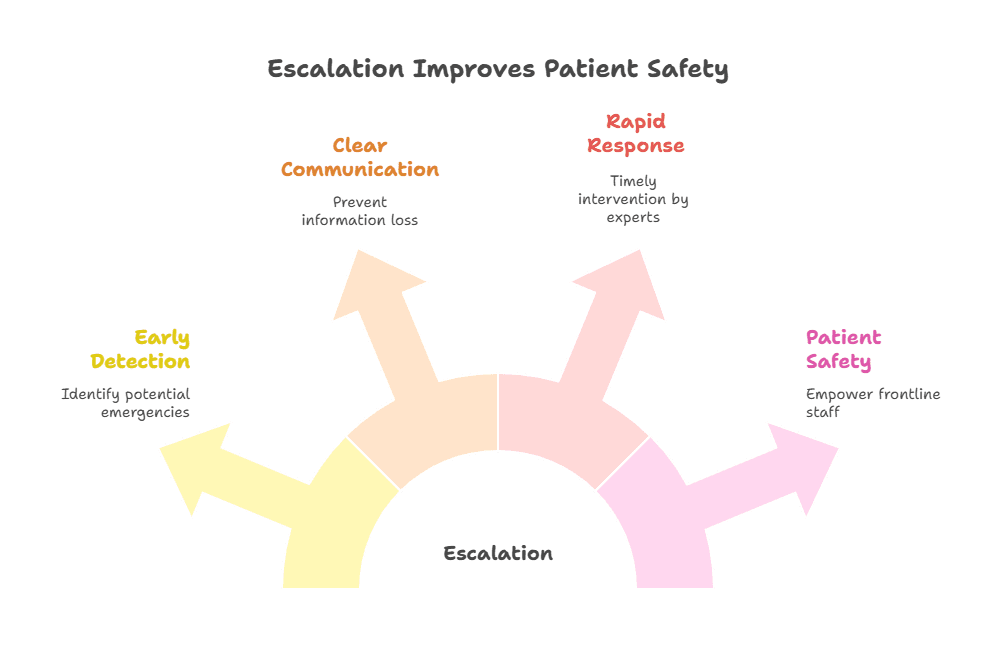On-Demand Outsourcing BPO Services for Healthcare Providers With 24/7 Coverage!
Save up to 70% on staffing costs!
Browse Specialty Staffing ServicesSummarize this blog post with:
What Role Does Escalation Play in Silent Healthcare Emergencies?

Not every healthcare emergency appears loud, obvious, or dramatic. Some unfold quietly, without clear signs, until they reach a critical stage. These silent healthcare emergencies include sudden internal bleeding, unnoticed strokes, sepsis, or even overlooked mental health crises. In these moments, escalation plays a life-saving role by alerting the right people quickly and ensuring immediate action.
Silent healthcare emergencies often hide behind subtle warning signs. A patient may look stable while experiencing internal complications. In hospital settings, warning signs might include a drop in oxygen levels, abnormal lab values, or behavioral changes that seem minor but signal serious risks.
Without escalation protocols, teams can miss these emergencies until it’s too late. Escalation ensures that once a nurse, monitoring system, or support staff identifies an early warning, the information reaches the right clinical decision-makers immediately.
The Role of Escalation
Escalation does more than pass information up the chain. It provides a structured process that makes sure silent emergencies do not remain silent. Its role includes:
-
Early Detection: Teams send subtle warning signs to the clinical team before conditions worsen.
-
Clear Communication: Structured protocols prevent information from getting lost in handoffs.
-
Rapid Response: Providers, specialists, or emergency teams step in quickly.
-
Patient Safety: Escalation gives frontline staff the support they need to act decisively.

Pain Points Without Escalation
Weak escalation systems create dangerous gaps in care that directly affect patient safety. Without clear escalation pathways, teams may miss subtle warning signs that indicate a patient is deteriorating. This leads to missed opportunities for early intervention, delayed diagnoses, and situations where treatable conditions become critical emergencies. In many cases, the lack of timely escalation turns manageable problems into life-threatening events.
The absence of strong escalation protocols also places strain on frontline staff. Nurses, agents, or support teams often feel powerless when their concerns aren’t taken seriously or communicated effectively. This creates frustration, lowers morale, and increases the risk of burnout. Meanwhile, poor communication between departments causes unnecessary delays in treatment, leaving patients vulnerable to harm and families questioning the reliability of the care system.
Solutions Through Outsourcing Support
Outsourcing strengthens escalation systems by providing trained virtual healthcare agents and monitoring staff who ensure no warning sign goes unnoticed. With partners like Staffingly, escalation support includes:
-
24/7 Monitoring: Virtual teams track patient data, flag anomalies, and escalate alerts in real time.
-
Structured Protocols: Trained staff follow escalation pathways that align with clinical standards.
-
Load Reduction: In-house staff can focus on patient care while outsourced teams handle constant monitoring.
-
Consistency: Every escalation follows a documented workflow, reducing errors and variability.
How Staffingly Implements Escalation Support?
Staffingly manages silent healthcare emergencies with precision by:
-
Training Agents: Outsourced agents receive weekly healthcare training to recognize escalation triggers.
-
Integrating Technology: Staffingly connects with EMRs and monitoring systems to track subtle changes.
-
Ensuring Real-Time Communication: Teams send escalations immediately via secure channels such as calls, alerts, or apps.
-
Maintaining Compliance: Every escalation is logged for accountability and regulatory standards.
-
Combining Human + Tech: Automated alerts are verified by trained agents before escalation, reducing false alarms.
Why Escalation Matters for Patients?
Patients rarely notice escalation, yet it often decides whether they receive timely intervention. Silent emergencies progress without obvious warning signs, so healthcare teams must act on subtle changes quickly. Escalation makes sure even the smallest red flags reach the right professionals before the condition becomes life-threatening.
Families trust healthcare systems to recognize what they cannot see. Escalation safeguards that trust by turning uncertainty into swift action. In silent emergencies, effective escalation protects patients, improves recovery chances, and ensures better outcomes.
What Did We Learn?
Silent healthcare emergencies remain among the most dangerous because they lack obvious warning signs. Escalation provides the lifeline that ensures teams act quickly on subtle changes. By establishing clear protocols, healthcare providers reduce delays, protect patients, and empower staff to raise concerns confidently.
With support from outsourcing partners like Staffingly, escalation systems gain even more strength. Through continuous training, real-time monitoring, and structured workflows, outsourced teams help healthcare providers prevent silent emergencies from going unnoticed. This blend of human vigilance and structured escalation ensures patients receive the safety and trust they deserve.
What People Are Asking?
Q: What are silent healthcare emergencies?
A: They are emergencies with hidden signs, such as internal bleeding, early sepsis, or unnoticed strokes.
Q: Why is escalation important?
A: Escalation ensures teams communicate early warning signs quickly to the right clinicians.
Q: How does outsourcing support escalation?
A: Outsourced teams provide 24/7 monitoring, structured protocols, and continuous training.
Q: How does Staffingly help providers?
A: Staffingly strengthens escalation with training, compliance, real-time monitoring, and integrated communication.
Disclaimer:
For informational purposes only; not applicable to specific situations.
For tailored support and professional services
Please contact Staffingly, Inc. at (800) 489-5877
Email: support@staffingly.com
About This Blog: This Blog is brought to you by Staffingly, Inc., a trusted name in healthcare outsourcing. The team of skilled healthcare specialists and content creators is dedicated to improving the quality and efficiency of healthcare services. The team passionate about sharing knowledge through insightful articles, blogs, and other educational resources.
 Book a Demo to Build Your Team Today!
Book a Demo to Build Your Team Today!

 Read Case Studies
Read Case Studies 



 Virtual Medical Assistants
Virtual Medical Assistants



